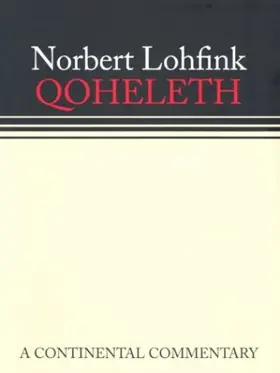

Qoheleth
Pages
144 pages
Publisher
Fortress Press
Published
3/1/2003
ISBN-13
9780800696047
This new addition to the successful Continental Commentary series is a significant and fresh treatment of Qoheleth (or Ecclesiastes). A famed professor presents a startlingly new translation of this often perplexing book of the Old Testament. Lohfink also argues for a rather different interpretation of the book than one finds elsewhere. Rather than reading the book's perspective as depressing, lost, or cynical, he highlights the elements of joy and balance. The volume includes introduction, new translation, commentary, parallel passages, bibliography, and indexes.
Reviews
Minneapolis: Fortress, 2003. Pp. xviii + 158. Hardcover. $23.00. ISBN 0800696042. Raymond C. Van Leeuwen Eastern University St. Davids, PA 19087 The 1980 German original of this commentary received a brief review in JBL 102 (1983): 322. That brief eighty-six-page commentary grew out of the author�s translation of Qoheleth for Die Einheits�bersetzung and was partly intended as an explanation of that translation�s renderings. It was intended for nonscholars and did not explicitly interact with other research; it rarely gave clues as to the bases for its often intriguing suggestions. The present English version of the commentary is expanded by a new preface and by additions and other changes that do not appear in the published German Vorlage but were completed about 1990 for a revision that did not appear in German. �So this English translation is now a new, and henceforth the only, authentic version� (ix, from Lohfink�s new preface). The changes are sometimes significant, though the book�s basic approach is unaltered. For instance, helpful diagrams of literary and thematic structures appear throughout that were not in the original. The book adds a selective bibliography up to 2000, though the commentary, like its Vorlage, does not engage the works listed and is of course uninfluenced by the important work of recent decades. A few characteristic features of the commentary should be noted. Under the influence of the �New Criticism,� the commentary pays part icular attention to literary structures and patterns, though diverging considerably from A. G. Wright�s famous attempts to explain �The Riddle of the Sphinx.� To my mind this re mains one of the more helpful features of the work: it forces the reader to look at the book as literature and to weigh his or her own outline of the book and its sections carefully.
[Full Review]
Minneapolis: Fortress, 2003. Pp. xviii + 158. Hardcover. $23.00. ISBN 0800696042. Daniel L. Smith-Christopher Loyola Marymount University Los Angeles, CA 90045 In the preface to this commentary, Professor Lohfink advises the reader that this is not an �academic commentary� and that he was �not thi nking of professors as readers� (vii). It is helpful to know this as one reads through this work, because it is certainly of a rather different character than, for example, Claus Westermann�s massive, three-volume work on the book of Genesis, which, nonetheless, appears in the same commentary series as the present work, a series beautifully published by Fortress Press. Given the parameters of the work�a commentary on a translation publishe d as the Deutsche Einheitsuebersetzung�Professor Lohfink�s work nevertheless represen ts the valuable observations of a respected scholar. As is traditional with commentaries, Prof. Lohfink�s general observations are included in the introduction, consisting of seventeen pages, and as these comments tend to clarify the approach of the commentary as a whole, it is important in this review to make observations mainly about this section. Lohfink dates Qoheleth �as late as possible� (4), noting that the Hebrew is akin to the Mishnah but that Sirach presupposes the existence of the work. Therefore, the early second century becomes his working assumption, near the transition from Ptolemaic to Seleucid rule, although Lohfink presumes the Ptolemaic setting almost exclusively.
[Full Review]
This commentary has an odd Sitz in dem Literaturgeschichte of the influential 1980 German Qoheleth commentary by Lohfink. It falls midway between the German Grundlage of 1980 and Lohfink�s current views, yet represents neither perfectly. Interestingly, Lohfink prepared a 1990 reworking of his 1980 work that never saw German publication. This unpublished German revision is the direct source from which McEvenue translated the 2003 English edition now under review. Still, in the preface Lohfink points out that, had he to write a new Qoheleth commentary at present, it would be substantially different from both the 1980 and the 1990/2003 editions. An additional dynamic of Lohfink�s original wo rk was that it was explicitly intended to be read concurrently with the German Einheits�bersetzung of the Bible of 1980. This referential character of the original volume will be lost on the English reader. However, the newly translated text of Qoheleth included in the pages of this book offsets any major difficulties readers may encounter in this regard. McEvenue�s translation was done in close c ooperation with Lohfink, with the Qoheleth text, however, translated afresh from the Hebrew by McEvenue, also in consultation with Lohfink. This ensures for the greater part a current English idiom.
[Full Review]
